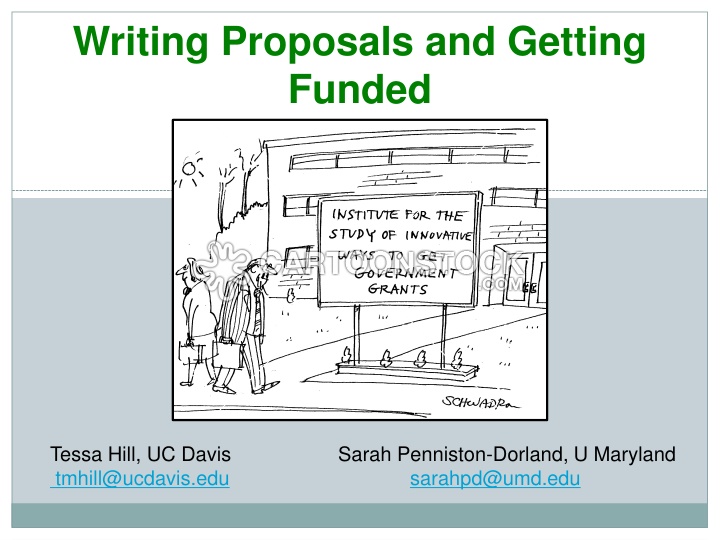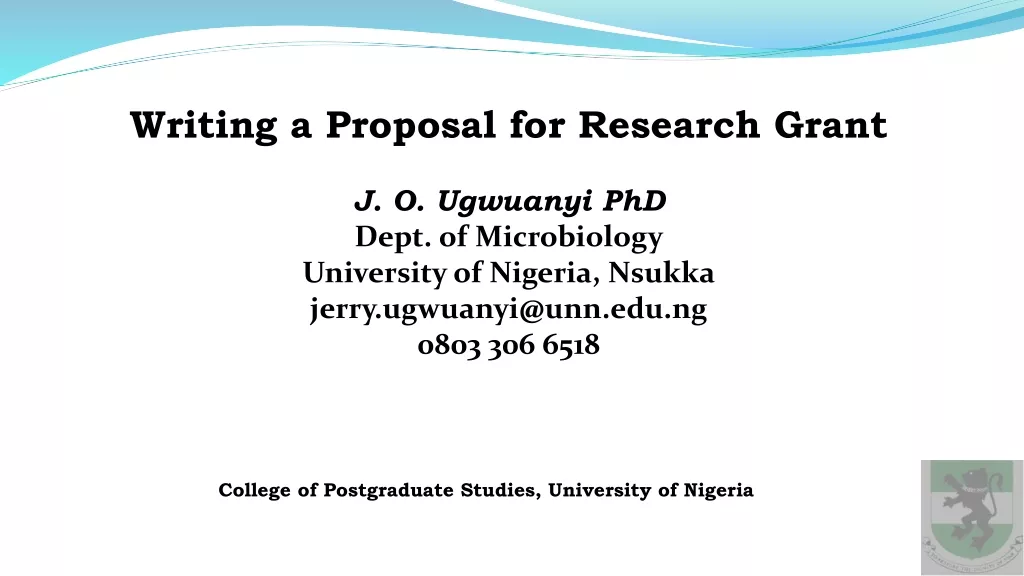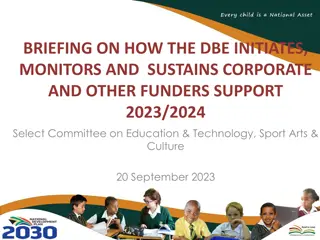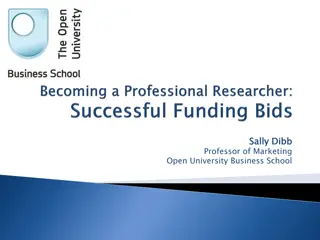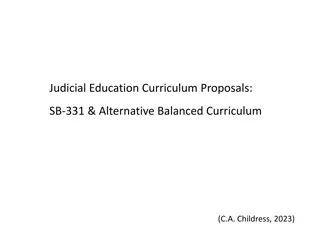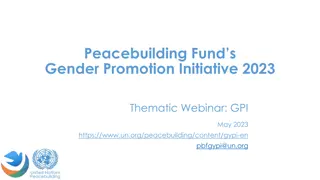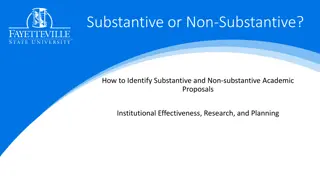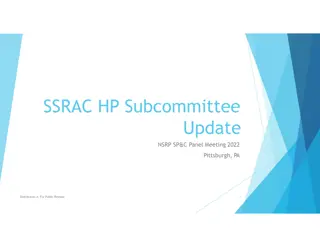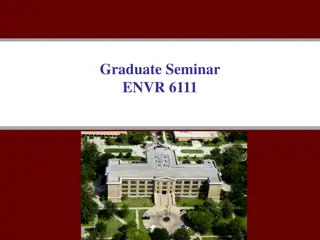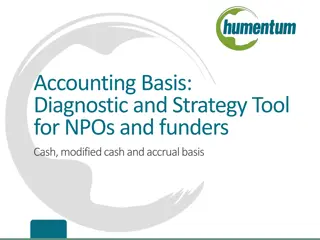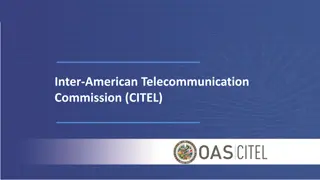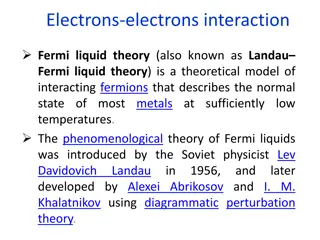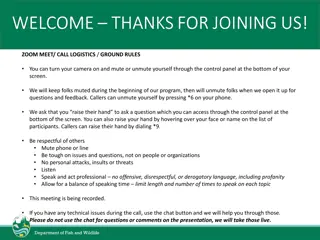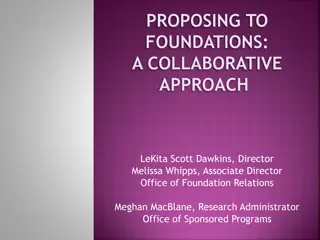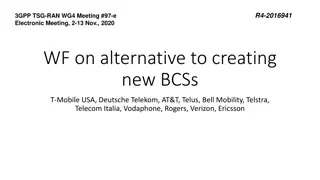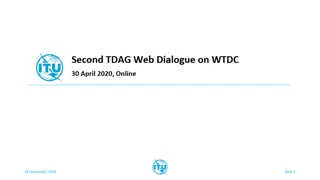Writing Successful Proposals: Interacting with Funders
This guide provides insights on interacting with program officers, finding funding opportunities, elements of successful proposals, common pitfalls, resubmissions, and strategies for effective proposal writing. It also covers how to engage with program officers, seek special funding opportunities, and utilize resources for grant writing.
Download Presentation

Please find below an Image/Link to download the presentation.
The content on the website is provided AS IS for your information and personal use only. It may not be sold, licensed, or shared on other websites without obtaining consent from the author.If you encounter any issues during the download, it is possible that the publisher has removed the file from their server.
You are allowed to download the files provided on this website for personal or commercial use, subject to the condition that they are used lawfully. All files are the property of their respective owners.
The content on the website is provided AS IS for your information and personal use only. It may not be sold, licensed, or shared on other websites without obtaining consent from the author.
E N D
Presentation Transcript
Writing Proposals and Getting Funded Tessa Hill, UC Davis tmhill@ucdavis.edu Sarah Penniston-Dorland, U Maryland sarahpd@umd.edu
Outline of topics Interacting with your Program Officer Sources for finding funding opportunities Elements of successful proposals Common pitfalls Resubmissions Myths debunked Strategies for proposal writing
Your Program Officer 1. Is a scholar in your field (usually) who knows what everybody is doing & is formative in directing the scholarship of your field; Can be permanent or temporary 1. Coordinates & runs the review process 2. Executes or makes funding decisions, depending upon agency policies 1. Advocates for your field in competition with other research areas and budget priorities. 1. Continues to work with you throughout your grant and is interested in your success
Ask your Program Officer (After doing your homework) 1. Does your program fund this type of research? 2. What is the average program budget and success rate; how many proposals in a competition? 3. What is the typical size of a successful new investigator project in this program? 4. What is the review and decision-making process in this program? 5. Are there special programs for which I qualify and how can I be considered for them? 6. Are you aware of other agencies or organizations that fund this kind of project?
Get funding calls for proposals to come to you Your Sponsored Projects Office Meet your SPO contact, make him/her familiar with your work Individual Agency email lists E.g. NSF (http://nsf.gov/funding/) Community of Scholars Pivot http://pivot.cos.com (Free 30-day trial) Discipline-specific listservs Acknowledgements sections at conference presentations Meeting with your program officers
A good source for information about Grant Writing: http://serc.carleton.edu/NAGTWorkshops/earlycareer/research/funding.html
Take advantage of special opportunities Packard Fellowship http://www.packard.org/what-we- fund/conservation-and-science/packard-fellowships-for-science- and-engineering/ NSF CAREER/PECASE http://www.nsf.gov/funding/pgm_summ.jsp?pims_id=503214 DOE Early Career Awards http://science.energy.gov/early- career/ HHMI Professorships (for undergrad research) http://www.hhmi.org/programs/society-of-hhmi-professors Opportunities at your institution for early career faculty
Proposal strategic planning Research significance Pick a research topic you are considering writing a proposal to fund. Why is this topic important? What is unique/transformative about the research? What are the benefits of this research? How does this research fit with your overall career plan?
Elements of Successful Proposals: Big Picture and Hypotheses The relevance and importance of the proposed work should be clearly stated. Connect it to the big picture. 1. Proposals should be hypothesis or question driven objectives/hypotheses/questions appear on the first 1-2 pages 1. Hypotheses should relatable to big picture questions Outline tests of hypotheses and expected outcomes Outline possible alternatives
Elements of Successful Proposals: Formatting and Writing Style Use images a picture is worth a thousand words. 1. Well organized, with underlining, differences in type, spacing, TITLES, to call attention to main points and structure 1. Written in appropriate size font. Smaller is not better! 2. Use active writing style rather than passive. This is not a research paper. [examples] 3. Describe new and exciting aspects of proposed research. Do not cast it as an extension of previous research. 4.
Elements of Successful Proposals: Leave No Unanswered Questions! Don t leave any questions in the reader s mind. Explain concepts clearly using concise language. Don t use overly specialized terminology. Provide preliminary data Demonstrates ability to conduct proposed research Makes expected outcomes clear. Demonstrate access to resources required for research (letters of support) Demonstrate expertise Use appropriate references (old and new) Refer to your published work on similar topics 1. 2. 3. 4.
Common pitfalls Too ambitious - for proposed budget, for personnel, for time 1. Results too specific and not generalizable 1. Importance of proposed work not fully explained 2.
Resubmissions Specifically and directly addresses each review critique Has substantially revised, rewritten, or removed sections that were critiqued in earlier reviews. Updates preliminary/pilot data and interpretations. Incorporates new references that may have appeared since the previous submission (or were missed in the prior proposal). Has a refined/revised list of potential reviewers based on reviews (some reading between the lines required). Appears noticeably stronger that the prior version. 1. 2. 3. 4. 5. 6.
Complete your strategic plan worksheet What resources do you need to be successful? What are some potential funding sources for this research? What strategies will you apply to develop your proposal? If funded, what is the timeline for this research?
Proposal-writing strategies Ask colleagues in the same field as you about expectations for proposals in your field Ask trusted colleagues to read through proposals
